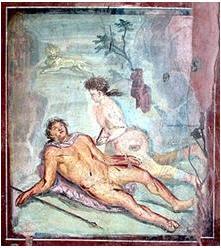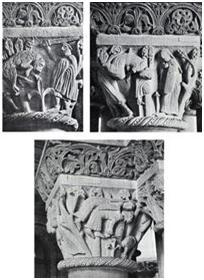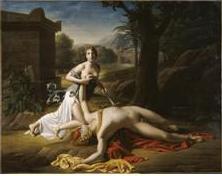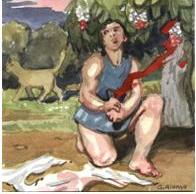It is difficult to escape the celebration of “Valentine’s Day, the lovers day.” A powerful tradition that has its roots in antiquity and in the Middle Ages and is currently anchored by the commercial interests of powerful corporations and business organizations, seems to prevail unchecked.
The matter is not without interest but I have to leave for another time to dig a little on the origin of the holiday, in the absence of the martyr Saint Valentine or of powerful arguments to doubt his existence, in the Christianization of a party of most important pagan holidays of February, the Lupercalia.
All this is of great interest, but I prefer to postpone its study. I want to limit myself now to tell one of the most beautiful love stories of antiquity that Ovid tells in his Metamorphoses, the tragic love story of Pyramus and Thisbe, two dead lovers by a tragic error.
The story, the tale, well known since Antiquity, was so successful since the Renaissance that it is but one from which seems to emerge the most famous tragedy of Shakespeare, Romeo and Juliet, who also used it on A Midsummer Night's Dream.
It is true that Hyginus, contemporary although a little older than Ovid, (64 BC -. 17) makes a simple reference to the story of Pyramus and Thisbe in his Fables Hyginus is a writer from Valencia, (Spain) according to Luis Vives, although others scholars doubt the place of his birth.
(See http://www.antiquitatem.com/en/moon-sun-eclipse-antikythera-mechanism )
He says in Fables, CCXLII:
…..Pyramus in Babylonia ob amorem Thisbes ipse se occidit…
Pyramus in Babylonia out of love for Thisbe killed himself.
CCXLII Qui se ipsi interfecerunt
CCXLIII Thisbe Babylonia propter Pyramum quod ipse se interfecerat.
Thisbe of Babylon killed herself because Pyramus had killed himself.
CCXLIII Quae se ipsae interfecerunt
But he is the poet Ovid who tells this story in Book IV of his work Metamorphoses. We know of no author who told in advance and there are few who do later, some with some variation.
The story is certainly of oriental origin, as evidenced its location in Babylon. Certainly since Ovid the story had remarkable success and was well known; before it seems that it was not known, judging by the words of Ovid: "vulgaris fabula non est" "it is not a popular story." In Late Antiquity there is a slightly different version of Nonnus, Latin author of the late IV or early of V century, in his Dyonisiaca XII, 84 et seq. He places it in Cilicia, not in Babylon.
Augustine presents us as one of the common themes that students have to develop as an exercise in studying rhetoric, which means that the issue was already well known. So he says, referring to the wall interposed between Pyramus and Thisbe in his On Order, De ordine, 1,3,8:
I tell you, that I irritate myself when I see you singing and suffering with these verses of all kinds that stand between you and the truth a wall thicker than this one they strove to raise between your lovers; but they were connected by a hairline crack. He tried then to sing Pyramus).
Irritor, inquam, abs te versus istos tuos omni metrorum genere cantando et ululando insectari, qui inter te atque veritatem immaniorem murum quam inter amantes tuos conantur erigere”. ; nam in se illi vel inolita rimula respirabant. Pyramum enim ille tum canere instituerat.
And then in the same De Ordine, 1,5,12
I tell you: so be it that you call me an irritating busybody; for surely I can not but be irritating if I have attack you when you talked with Pyramus and Thisbe …
Cui ego licet, inquam, me odiosum percontatorem voces; vix enim possum non esse,qui expugnavi me cum Pyramo et Thisbe coloqueris
In the Middle Ages it is commonplace as reference to "unhappy love". The myth appears in all medieval European literature: in Spain and appears in The Fazienda overseas, probably in the year 1153. In France there are numerous examples; it is sufficient the Chretien de Troyes in his Conte of Charrette. Chaucer in England told the story in his The Legend of Good Women. In Italy, Boccaccio summarizes the fable in his De claris mulieribus, although the names of Pyramus and Thisbe not appear.
In Spain it has a minor presence in the Middle Ages by the general lack of Ovid, but it seems that the Marquis de Santillana and Gomez Manrique had a translation of the Metamorphoses. But since the Renaissance there are dozens poets and literary authors who replicate the legend, of which are also numerous fictional romances that were sung in Spain and Portugal. Numerous editions and translations of Ovid from the Renaissance facilitated the direct relationship between authors and this legend.
I want to emphasize only two of Spanish authors without going into the matter, because my interest at the moment is to provide readers with direct text of Ovide; so they can enjoy an exciting literary narrative. These two authors are Cervantes, who in his Don Quixote makes three references to the unhappy love affair: the story of Cardenio and Lucinda in First Part (I, 23-24), and in the Second the sonnet of Lorenzo Miranda, son of The Knight of the Green Gaban, (II, 16-18) and the episode of the Wedding of Camacho (II, 19,20 and 21) with the comic inversion of the fatal love.
I offer the Miranda’s Lorenzo sonnet, because it is shorter:
The lovely maid, she pierces now the wall;
Heart-pierced by her young Pyramus doth lie;
And Love spreads wing from Cyprus isle to fly,
A chink to view so wondrous great and small.
There silence speaketh, for no voice at all
Can pass so strait a strait; but love will ply
Where to all other power 'twere vain to try;
For love will find a way whate'er befall.
Impatient of delay, with reckless pace
The rash maid wins the fatal spot where she
Sinks not in lover's arms but death's embrace.
So runs the strange tale, how the lovers twain
One sword, one sepulchre, one memory,
Slays, and entombs, and brings to life again.
(Translated by John Ormsby)
El muro rompe la doncella hermosa
que de Píramo abrió el gallardo pecho;
parte el Amor de Chipre y va derecho
a ver la quiebra estrecha y prodigiosa.
Habla el silencio allí, porque no osa
La voz entrar por tan estrecho estrecho;
las almas sí, que amor suele de hecho
facilitar la más difícil cosa
Saltó el deseo de compás y el paso
de la imprudente virgen solicita
por su gusto su muerte. Ved qué historia;
Que a entrambos en un punto, ¡oh extraño caso!,
los mata, los encubre y resucita
una espada, un sepulcro, una memoria.
The other is Gongora, who wrote the story, albeit humorous, or to be more precise, difficult to interpret, that is now known as the Enlightenment and Defense of the Fable of Pyramus and Thisbe (1618). Gongora had previously alluded to the theme of Pyramus and Thisbe in one of the Letrillas (a brief poem) in which the popular refrain 'let me go warm and the people may laugh” is repeated.
Because love is so cruel
that thalamus makes a sword
of Pyamus and his love,
where he and she together are,
let be my Tisbe a cake
and let be the sword my tooth
and the people may laugh
Pues amor es tan cruel
que de Píramo y su amada
hace tálamo una espada,
do se junten ella y él,
sea mi Tisbe un pastel
ya la espada sea mi diente
y ríase la gente.
Shakespeare, meanwhile, recalls the story in the famous tragedy Romeo and Juliet and with an ironic tone in "A Midsummer Night's Dream", though specialists say that the English author does not was directly influenced by the work of Ovid, but the influence came indirectly from Italian authors from the poem by Arthur Brooke the Tragical Historye of Romeus and Juliet and from translation of William Painter "Rhomeo and Julietta"; these authors made use of a French version of Pierre Boaiastou which was based on Romeo and Giuletta of Mateo Bandello and a Giulietta e Romeo of Luigi da Porto.
But Shakespeare would have no difficulty in knowing such a popular topic in Europe: Golding had had translated the Metamorphoses in 1567.
Of course the issue was relevant to other artists in addition to the letters, as painters and musicians, from ancient times to the present day.
I offer only four examples of paintings on the theme: A first-century Pompeii, one from a twelfth-century Romanesque capital in Basel, one of the XVIII-XIX and one absolutely contemporary.

Pyramus and Thisbe represented in a fresco of the House of Octavius Cuartio (Pompeii). S. I d.C.

Cloister of the Cathedral of Basel, late twelfth century, (with a Christian moralizing interpretation)

Pierre-Claude Gautherot, (1769-1825),

Gabriel Alonso, painting published by the digital publishing One and Zero (http://unoyceroediciones.com/)
Examples of music go from opera A Midsummer Night's Dream, by Benjamin Britten based on A Midsummer Night's Dream or West Side Story based on Romeo and Juliet to the adaptation of the Beatles, in which Paul McCartney was Pyramus, Thisbe was John Lennon, George Harrison was the Moon and Ringo Starr was the lion.
But enough of much scholarly considerations and inconsequential curiosities and let us allow the poet Ovid to relate in detail the unfortunate history.
Metamorphoses, IV, 42…..54; 55-166
it pleased her sisters, and they ordered her
to tell the story that she loved the most.
So, as she counted in her well-stored mind
the many tales she knew, first doubted she
whether to tell the tale of Derceto,—
that Babylonian, who, aver the tribes
of Palestine, in limpid ponds yet lives,—
her body changed, and scales upon her limbs;
…..
or of that tree
which sometime bore white fruit, but now is changed
and darkened by the blood that stained its roots.—
Pleased with the novelty of this, at once
she tells the tale of Pyramus and Thisbe;—
and swiftly as she told it unto them,
the fleecy wool was twisted into threads.
PYRAMUS AND THISBE
When Pyramus and Thisbe, who were known
the one most handsome of all youthful men,
the other loveliest of all eastern girls,—
lived in adjoining houses, near the walls
that Queen Semiramis had built of brick
around her famous city, they grew fond,
and loved each other—meeting often there—
and as the days went by their love increased.
They wished to join in marriage, but that joy
their fathers had forbidden them to hope;
and yet the passion that with equal strength
inflamed their minds no parents could forbid.
No relatives had guessed their secret love,
for all their converse was by nods and signs;
and as a smoldering fire may gather heat,
the more 'tis smothered, so their love increased.
Now, it so happened, a partition built
between their houses, many years ago,
was made defective with a little chink;
a small defect observed by none, although
for ages there; but what is hid from love?
Our lovers found the secret opening,
and used its passage to convey the sounds
of gentle, murmured words, whose tuneful note
passed oft in safety through that hidden way.
There, many a time, they stood on either side,
thisbe on one and Pyramus the other,
and when their warm breath touched from lip to lip,
their sighs were such as this: “Thou envious wall
why art thou standing in the way of those
who die for love? What harm could happen thee
shouldst thou permit us to enjoy our love?
But if we ask too much, let us persuade
that thou wilt open while we kiss but once:
for, we are not ungrateful; unto thee
we own our debt; here thou hast left a way
that breathed words may enter loving ears.,”
so vainly whispered they, and when the night
began to darken they exchanged farewells;
made presence that they kissed a fond farewell
vain kisses that to love might none avail.
When dawn removed the glimmering lamps of night,
and the bright sun had dried the dewy grass
again they met where they had told their love;
and now complaining of their hapless fate,
in murmurs gentle, they at last resolved,
away to slip upon the quiet night,
elude their parents, and, as soon as free,
quit the great builded city and their homes.
Fearful to wander in the pathless fields,
they chose a trysting place, the tomb of Ninus,
where safely they might hide unseen, beneath
the shadow of a tall mulberry tree,
covered with snow-white fruit, close by a spring.
All is arranged according to their hopes:
and now the daylight, seeming slowly moved,
sinks in the deep waves, and the tardy night
arises from the spot where day declines.
Quickly, the clever Thisbe having first
deceived her parents, opened the closed door.
She flitted in the silent night away;
and, having veiled her face, reached the great tomb,
and sat beneath the tree; love made her bold.
There, as she waited, a great lioness
approached the nearby spring to quench her thirst:
her frothing jaws incarnadined with blood
of slaughtered oxen. As the moon was bright,
Thisbe could see her, and affrighted fled
with trembling footstep to a gloomy cave;
and as she ran she slipped and dropped her veil,
which fluttered to the ground. She did not dare
to save it. Wherefore, when the savage beast
had taken a great draft and slaked her thirst,
and thence had turned to seek her forest lair,
she found it on her way, and full of rage,
tore it and stained it with her bloody jaws:
but Thisbe, fortunate, escaped unseen.
Now Pyramus had not gone out so soon
as Thisbe to the tryst; and, when he saw
the certain traces of that savage beast,
imprinted in the yielding dust, his face
went white with fear; but when he found the veil
covered with blood, he cried; “Alas, one night
has caused the ruin of two lovers! Thou
wert most deserving of completed days,
but as for me, my heart is guilty! I
destroyed thee! O my love! I bade thee come
out in the dark night to a lonely haunt,
and failed to go before. Oh! whatever lurks
beneath this rock, though ravenous lion, tear
my guilty flesh, and with most cruel jaws
devour my cursed entrails! What? Not so;
it is a craven's part to wish for death!”
So he stopped briefly; and took up the veil;
went straightway to the shadow of the tree;
and as his tears bedewed the well-known veil,
he kissed it oft and sighing said, “Kisses
and tears are thine, receive my blood as well.”
And he imbrued the steel, girt at his side,
deep in his bowels; and plucked it from the wound,
a-faint with death. As he fell back to earth,
his spurting blood shot upward in the air;
so, when decay has rift a leaden pipe
a hissing jet of water spurts on high.—
By that dark tide the berries on the tree
assumed a deeper tint, for as the roots
soaked up the blood the pendent mulberries
were dyed a purple tint.
Thisbe returned,
though trembling still with fright, for now she thought
her lover must await her at the tree,
and she should haste before he feared for her.
Longing to tell him of her great escape
she sadly looked for him with faithful eyes;
but when she saw the spot and the changed tree,
she doubted could they be the same, for so
the colour of the hanging fruit deceived.
While doubt dismayed her, on the ground she saw
the wounded body covered with its blood;—
she started backward, and her face grew pale
and ashen; and she shuddered like the sea,
which trembles when its face is lightly skimmed
by the chill breezes;—and she paused a space;—
but when she knew it was the one she loved,
she struck her tender breast and tore her hair.
Then wreathing in her arms his loved form,
she bathed the wound with tears, mingling her grief
in his unquenched blood; and as she kissed
his death-cold features wailed; “Ah Pyramus,
what cruel fate has taken thy life away?
Pyramus! Pyramus! awake! awake!
It is thy dearest Thisbe calls thee! Lift
thy drooping head! Alas,”—At Thisbe's name
he raised his eyes, though languorous in death,
and darkness gathered round him as he gazed.
And then she saw her veil; and near it lay
his ivory sheath—but not the trusty sword
and once again she wailed; “Thy own right hand,
and thy great passion have destroyed thee!—
And I? my hand shall be as bold as thine—
my love shall nerve me to the fatal deed—
thee, I will follow to eternity—
though I be censured for the wretched cause,
so surely I shall share thy wretched fate:—
alas, whom death could me alone bereave,
thou shalt not from my love be reft by death!
And, O ye wretched parents, mine and his,
let our misfortunes and our pleadings melt
your hearts, that ye no more deny to those
whom constant love and lasting death unite—
entomb us in a single sepulchre.
“And, O thou tree of many-branching boughs,
spreading dark shadows on the corpse of one,
destined to cover twain, take thou our fate
upon thy head; mourn our untimely deaths;
let thy fruit darken for a memory,
an emblem of our blood.” No more she said;
and having fixed the point below her breast,
she fell on the keen sword, still warm with his red blood.
But though her death was out of Nature's law
her prayer was answered, for it moved the Gods
and moved their parents. Now the Gods have changed
the ripened fruit which darkens on the branch:
and from the funeral pile their parents sealed
their gathered ashes in a single urn.
So ended she; at once Leuconoe
took the narrator's thread; and as she spoke
her sisters all were silent.
(Translation from Ovid, Metamorphoses. Brookes More. Boston. Cornhill Publishing Co. 1922).
Dicta probant primamque iubent narrare sorores.
Illa, quid e multis referat (nam plurima norat),
cogitat et dubia est, de te, Babylonia, narret,
Derceti, quam versa squamis velantibus artus
stagna Palaestini credunt motasse figura;
……
an, quae poma alba ferebat,
ut nunc nigra ferat contactu sanguinis arbor.
Hoc placet, hanc, quoniam vulgaris fabula non est,
talibus orsa modis, lana sua fila sequente:
…..
55-168
Pyramus et Thisbe.
“Pyramus et Thisbe, iuvenum pulcherrimus alter,
altera, quas oriens habuit, praelata puellis,
contiguas tenuere domos, ubi dicitur altam
coctilibus muris cinxisse Semiramis urbem.
Notitiam primosque gradus vicinia fecit:
tempore crevit amor. Taedae quoque iure coissent:
sed vetuere patres. Quod non potuere vetare,
ex aequo captis ardebant mentibus ambo.
Conscius omnis abest: nutu signisque loquuntur,
quoque magis tegitur, tectus magis aestuat ignis.
Fissus erat tenui rima, quam duxerat olim,
cum fieret paries domui communis utrique.
Id vitium nulli per saecula longa notatum
(quid non sentit amor?) primi vidistis amantes,
et vocis fecistis iter; tutaeque per illud
murmure blanditiae minimo transire solebant.
Saepe, ubi constiterant hinc Thisbe, Pyramus illinc,
inque vices fuerat captatus anhelitus oris,
“invide” dicebant “paries, quid amantibus obstas?
quantum erat, ut sineres toto nos corpore iungi,
aut hoc si nimium est, vel ad oscula danda pateres?
Nec sumus ingrati: tibi nos debere fatemur,
quod datus est verbis ad amicas transitus aures.”
Talia diversa nequiquam sede locuti
sub noctem dixere ”vale” partique dedere
oscula quisque suae non pervenientia contra.
Postera nocturnos aurora removerat ignes,
solque pruinosas radiis siccaverat herbas:
ad solitum coiere locum. Tum murmure parvo
multa prius questi, statuunt, ut nocte silenti
fallere custodes foribusque excedere temptent,
cumque domo exierint, urbis quoque tecta relinquant;
neve sit errandum lato spatiantibus arvo,
conveniant ad busta Nini lateantque sub umbra
arboris. Arbor ibi, niveis uberrima pomis
ardua morus, erat, gelido contermina fonti.
Pacta placent. Et lux, tarde discedere visa,
praecipitatur aquis, et aquis nox exit ab isdem.
Callida per tenebras versato cardine Thisbe
egreditur fallitque suos, adopertaque vultum
pervenit ad tumulum, dictaque sub arbore sedit.
Audacem faciebat amor. Venit ecce recenti
caede leaena boum spumantes oblita rictus,
depositura sitim vicini fontis in unda.
Quam procul ad lunae radios Babylonia Thisbe
vidit et obscurum timido pede fugit in antrum,
dumque fugit, tergo velamina lapsa reliquit.
Ut lea saeva sitim multa conpescuit unda,
dum redit in silvas, inventos forte sine ipsa
ore cruentato tenues laniavit amictus.
Serius egressus vestigia vidit in alto
pulvere certa ferae totoque expalluit ore
Pyramus: ut vero vestem quoque sanguine tinctam
repperit, “una duos” inquit “nox perdet amantes.
E quibus illa fuit longa dignissima vita,
nostra nocens anima est: ego te, miseranda, peremi,
in loca plena metus qui iussi nocte venires,
nec prior huc veni. Nostrum divellite corpus,
et scelerata fero consumite viscera morsu,
o quicumque sub hac habitatis rupe, leones.
Sed timidi est optare necem.” Velamina Thisbes
tollit et ad pactae secum fert arboris umbram;
utque dedit notae lacrimas, dedit oscula vesti,
“accipe nunc” inquit “nostri quoque sanguinis haustus!”
quoque erat accinctus, demisit in ilia ferrum,
nec mora, ferventi moriens e vulnere traxit.
Ut iacuit resupinus humo: cruor emicat alte,
non aliter quam cum vitiato fistula plumbo
scinditur et tenui stridente foramine longas
eiaculatur aquas atque ictibus aera rumpit.
Arborei fetus adspergine caedis in atram
vertuntur faciem, madefactaque sanguine radix
purpureo tingit pendentia mora colore.
Ecce metu nondum posito, ne fallat amantem,
illa redit iuvenemque oculis animoque requirit,
quantaque vitarit narrare pericula gestit.
Utque locum et visa cognoscit in arbore formam,
sic facit incertam pomi color: haeret, an haec sit.
Dum dubitat, tremebunda videt pulsare cruentum
membra solum, retroque pedem tulit, oraque buxo
pallidiora gerens exhorruit aequoris instar,
quod tremit, exigua cum summum stringitur aura.
Sed postquam remorata suos cognovit amores,
percutit indignos claro plangore lacertos,
et laniata comas amplexaque corpus amatum
vulnera supplevit lacrimis fletumque cruori
miscuit et gelidis in vultibus oscula figens
“Pyrame” clamavit “quis te mihi casus ademit?
Pyrame, responde: tua te carissima Thisbe
nominat: exaudi vultusque attolle iacentes!”
Ad nomen Thisbes oculos iam morte gravatos
Pyramus erexit, visaque recondidit illa.
Quae postquam vestemque suam cognovit et ense
vidit ebur vacuum, “tua te manus” inquit “amorque
perdidit, infelix. Est et mihi fortis in unum
hoc manus, est et amor: dabit hic in vulnera vires.
Persequar exstinctum letique miserrima dicar
causa comesque tui; quique a me morte revelli
heu sola poteras, poteris nec morte revelli.
Hoc tamen amborum verbis estote rogati,
o multum miseri meus illiusque parentes,
ut quos certus amor, quos hora novissima iunxit,
conponi tumulo non invideatis eodem.
At tu quae ramis arbor miserabile corpus
nunc tegis unius, mox es tectura duorum,
signa tene caedis pullosque et luctibus aptos
semper habe fetus, gemini monimenta cruoris.”
Dixit, et aptato pectus mucrone sub imum
incubuit ferro, quod adhuc a caede tepebat.
Vota tamen tetigere deos, tetigere parentes:
nam color in pomo est, ubi permaturuit, ater,
quodque rogis superest, una requiescit in urna.”
Desierat, mediumque fuit breve tempus, et orsa est
dicere Leuconoe: vocem tenuere sorores.

